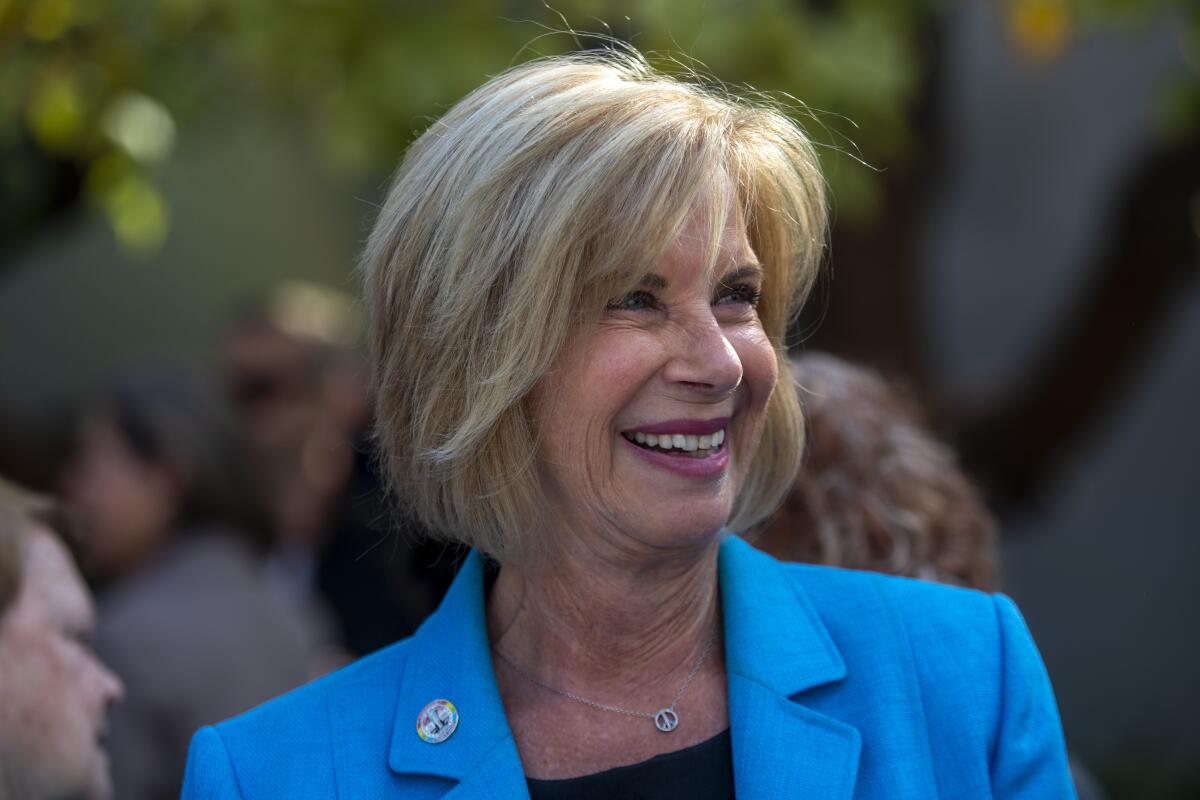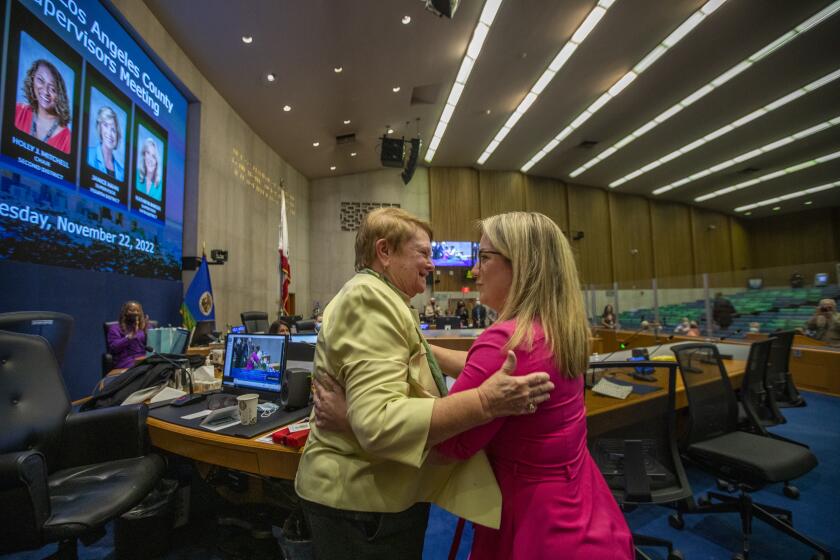L.A. County supervisors poised to expand public access at meetings

The Los Angeles County Board of Supervisors plans to roll back some of the early pandemic-era rules restricting public testimony, pledging to give constituents more face time with their politicians.
The changes were laid out in a statement Friday from Supervisor Janice Hahn, who will take over as board chair next week.
“The changes that were made to the board meetings during the pandemic kept people safe, but came at the expense of unlimited access by the public to our work,” Hahn said. “As chair, my goal is to increase the public’s ability to participate in our meetings and weigh in, in real time, on policies the board is considering.”
As many residents isolated themselves during the COVID-19 pandemic, some county government watchers criticized the board for similarly retreating from the public eye. For a few months, the public could only listen in passively to the remotely held board meetings, leading Hahn to once equate the meetings to a “tightly run conference call.”
L.A. County Supervisor Sheila Kuehl is honored by colleagues as she retires at 81, following two terms on the Board of Supervisors and a legislative career.
When the public was again able to address county leaders in real time, their window to do so had been condensed to an hour and a half at the start of the meeting. The board has since returned to in-person meetings, though the politicians remain shielded from the public by protective glass put in place during the pandemic.
According to a release sent out by Hahn’s office, starting Tuesday the public will be able to weigh in after every significant item the board discusses. There will also be time to speak on smaller items that the supervisors vote on but don’t discuss, as well as a general comment period for the public. People can still speak in person or remotely.
Outgoing Chair Holly Mitchell, who helped get the board back to in-person meetings, said she thought it was important to keep these hybrid meetings.
“People don’t always have the luxury to take off work, come downtown, pay $20 or more in parking and sit half a [day] or all day to engage,” she said.
She also noted one advantage of holding public testimony at the start of the meeting was that people didn’t have to wait hours for the topic they were invested in to be discussed.
Hahn’s changes will guide the supervisors through the next year of meetings, at which they will try to repair a social safety net that is straining under the weight of residents in crisis in every corner of the county — from Long Beach, where the homeless population is believed to have increased over 60% in the last two years, to the Antelope Valley, which has seen a rise in homeless encampments isolated in the desert.
At the same time, county leaders will need to confront the issues cropping up internally.
The Probation Department is in crisis, with officers at the county’s juvenile halls refusing to come to work, saying they feel unsafe and outnumbered. The future of the run-down Men’s Central Jail remains uncertain more than two years after the board vowed to shut it down and find alternatives for the thousands of people locked inside. And the relationship between the supervisors and the Sheriff’s Department has teetered from tense to dysfunctional after four years of feuding with outgoing Sheriff Alex Villanueva.
Mitchell said she expects the temperature to simmer down with the November passage of Measure A, which allows the board to oust a sheriff if it decides that he or she is not fit for the job, and permits the election of a less polarizing sheriff.
Robert Luna, a retired Long Beach police chief who handily beat Villanueva in November, has promised to repair the relationship between the agency and the politicians who control its purse strings.
“He, like every other department head, has a responsibility to manage his budget,” Mitchell said of the new sheriff. “I think he fundamentally understands that, unlike his predecessor.”
Board members say they plan to spend 2023 addressing issues most important to voters: public safety, mental health and homelessness. When the board convenes Tuesday, the five members will vote on what they want the county to lobby for in the upcoming year.
Get the lowdown on L.A. politics
Sign up for our L.A. City Hall newsletter to get weekly insights, scoops and analysis.
You may occasionally receive promotional content from the Los Angeles Times.
According to the documents detailing the board’s priorities, the supervisors want to advance the “Care First, Jails Last” initiative, a county-led push to find alternatives to incarceration. They want to ramp up funding for mental health services and behavioral health providers, who are in high demand and short supply across the state. And they want to see more financial and legal help going to families living precariously on the brink of homelessness, who are one missed paycheck away from eviction.
There will be one new face next week. Supervisor-elect Lindsey Horvath will be sworn in Monday, a little more than two weeks after declaring victory in her bid to represent the 3rd District following Sheila Kuehl’s retirement.
Once she is officially sworn in at noon, Horvath says, she wants to start pushing for more alternatives to jail and fundamental changes to the Los Angeles Homeless Services Authority. Throughout the campaign, Horvath had called for a simplification of the region’s complex homeless bureaucracy.
“The top priority is homelessness,” she said. “We’ll be working very closely to make sure the city and county are working hand in glove.”
Horvath said she has asked Kuehl’s staff to stay on for 90 days as she finds her footing in the new role and makes hires. She said she has just begun moving into her new eighth-floor office at the Kenneth Hahn Hall of Administration.
More to Read
Sign up for Essential California
The most important California stories and recommendations in your inbox every morning.
You may occasionally receive promotional content from the Los Angeles Times.












